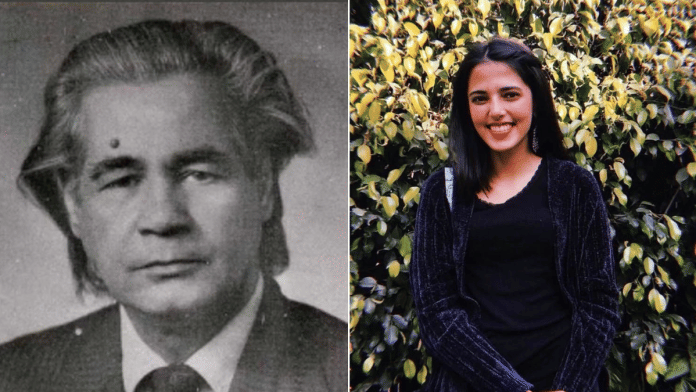New Delhi: “Everyday political”, is how ThePrint’s Insha Jalil Waziri would describe the poem ‘Mera Safar’ by Urdu poet, lyricist, and critic Ali Sardar Jafri. Her English translation of the poem has earned her the 2024 Jawad Memorial Prize for Urdu-to-English translation.
Its recurring theme of “main phir aaunga, main phir bolunga” (I’ll come back, I’ll speak again) reminded Waziri of Walt Whitman’s book Leaves of Grass, she said.
“In the dystopian times that we live in, this poem carries a powerful message of hope and renewal… There is an overriding sense of optimism despite an acknowledgment of death and endings,” said Waziri.
The judges, writer Dr Syeda Hameed and translator and literary critic Professor Nishat Zaidi, said Waziri’s translation was chosen as the winner because it “not only aligns beautifully with this year’s theme…(but) also captures the lyrical beauty of the poem in all its poignancy”.
“Jafri’s abundance of phrases, exuberance, natural lyricism, energy, abiding hope, and commitment to life are beautifully rendered into English in this translation,” the jury said.
Waziri thanked the organisers for choosing the theme of “resurgence” as it is “not something that is talked about nearly enough”. She wishes there were more such opportunities within the Urdu literary community.
But so far, she is “thrilled and proud—maybe a little overwhelmed too”. And mostly “inspired to chase this feeling again”.
The runner-up to Waziri was Vinay Rajoria’s translation of ‘Vo Subah Kabhi To Ayegi‘ by poet Sahir Ludhianvi.
The Jawad Memorial Prize was instituted 5 years ago to celebrate the literary brilliance Ali Jawad Zaidi, who died in 2004.
Zaidi’s works, including A History of Urdu Literature, Uttar Pradesh ke Marsiyago, and Taarikh-e-Mushayara, earned him accolades such as the Padma Shri, the Ghalib Award, and the Mir Anis Award—cementing his legacy in the world of Urdu literature.
Why ‘Mera Safar’
Poet Ali Sardar Jafri’s understanding of renewal and resurrection deeply spoke to Waziri. “The poet is agonisingly aware that he is but a moment in time, but he also knows that it’s a moment that will come again. It’s a feeling that will return. He is hopeful in his fleeting mortality,” she said.
The journalist also described “Mera Safar” as a “beautiful, moving poem with lyrical fluidity and evocative imagery”.
“My main goal was to preserve its lyrical beauty and vivid imagery. Translations often lose some of the original work’s essence, and I was determined not to let that happen,” the poetry enthusiast said.
“I wanted English readers to experience it with the same depth and grace it offers in its original form,” she said on why she approached the translation with utmost care.
‘A delicate balancing act’
Waziri’s journey into translation began almost by chance. She discovered her love for it while attending a Hindi class during her BA in psychology and philosophy at Jesus and Mary College, Delhi University.
“The teacher kept explaining, and I kept translating. It felt so natural, almost like second nature,” she recalled.
A significant break came when Waziri got the chance to translate the short story ‘Usne Kaha Tha‘ by Chandradhar Sharma Guleri. “I fell in love with the process of carrying a text across languages—all the while mindful of the losses but happy with what I could convey,” Waziri said.
However, translation is not without its challenges. Waziri described it as a “delicate balancing act” between staying true to the original and interpreting it subtly. “There’s always some interpretation involved, but it should never get reflected in the text,” she explained.
Another skill she’s honing is recognising untranslatable words and contextually explaining them without bogging down the reader.
Though the Jawad Memorial Prize is her first award, Waziri has a few more works under her belt.
Apart from the translation of Guleri’s story, which was published in Bloomsbury India’s The Great War, she has translated excerpts from Bhisham Sahni’s play Rang De Basanti for the book Jallianwala Bagh: Literary Responses in Prose & Poetry.
Waziri also writes poetry, having been published by the New Weather Institute in the UK.
‘Urdu speaking home’
For Waziri, the love for Urdu runs in her DNA.
Her great-grandfather, Professor Ale Ahmad Suroor, was a luminary in Urdu literature—a poet, academic, and literary critic. Her mother is a writer and literary historian, while her father retired as a Delhi High Court judge.
“In Urdu-speaking homes like mine, even daily conversations are delightful,” Waziri said. “It’s peppered with colourful colloquialisms, flavourful idioms, fragments of Urdu poetry, snippets from qissa kahanis. And the wit and satire in Urdu!”
“There’s no shortage of options,” she said, adding that Urdu allows you to even insult people in the nicest, politest, and funniest ways possible. “It’s a beautiful language and one without any curse words. So, you get creative with your insults.”
Waziri’s family is already pushing her to dive into more translation projects. She recalls her father’s reaction after reading her award-winning work: “He looked at me and said, ‘I didn’t know you could write that well.’”
(Edited by Tikli Basu)
Also read: A 9th-century critic freed Ramayana of religious meanings. It was just literature for him






